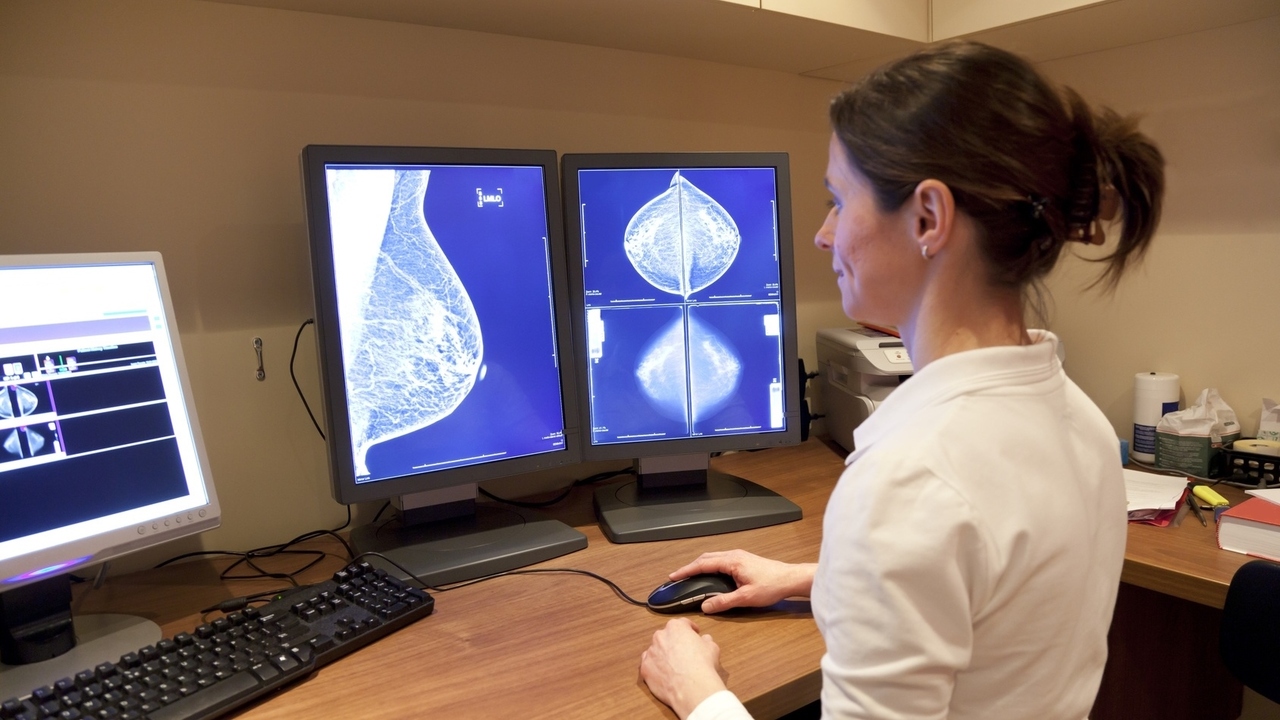 Picture Partners/Fotolia
Picture Partners/Fotolia
Heart disease causes one in every four deaths among women, according to the National Institutes of Health. Yet heart disease doesn't get the attention that some other conditions do, such as breast cancer which affects one in eight women.
On March 24, 2016, a study was published in the Journal of the American College of Cardiology Imaging which indicated that the risk for heart attacks and strokes in women could be decreased by using mammogram data as a tool for early detection. The research was carried out by a team from Mount Sinai St. Luke's hospital in New York.
Lead author Harvey Hecht said that a mammogram can highlight the amount of calcium in arteries of a woman's breast. This can also detect the calcified plaque in her coronary arteries. A mammogram takes note of calcified tissue, including arterial calcification.
Researcher Dr. Laurie Margolies, who is also the director of breast imaging at Mount Sinai Hospital in New York City, said that radiologists can see calcium deposits in arteries to the breasts as well.
Records of 292 women were used for this research, to test data from their digital mammograms as well as their separate and unrelated computed tomography, or CT, scans of their chest from within the same 12-month period.
Would indications of breast arterial calcification help to catch coronary artery calcification?
As it turned out, breast arterial calcification detected approximately 70 percent of the incidences of coronary artery calcification.
CT scans indicated that 47.5 percent of the women had signs of calcium buildup in their coronary arteries. Women who were older amongst the group and who had several chronic health conditions were more likely to have calcium buildup.
Large calcium deposits in breast arteries may be early signs of heart disease, according to study authors. This research showed a more direct link between calcifications in the coronary and mammary arteries.
Margolies advises that women ask their radiologists for reports on any calcium buildup in their breast arteries as seen in a mammogram.
The implications of this research are exciting. Mammography data could be sent to a woman's doctor or cardiologist to see if there are any signs of coronary artery calcification.
Study results will be presented at the 65th annual conference of the American College of Cardiology in Chicago on April 3, 2016.
For more information, click here.
Reviewed March 25, 2016
by Michele Blacksberg RN
Mammograms May Double as Heart Disease Prevention Tool. Healthline.com. Retrieved March 24, 2016.
http://www.healthline.com/health-news/mammograms-double-as-heart-disease-prevention-tool#1
Mammograms May Detect More Than Just Breast Cancer. Health.com. Retrieved March 24, 2016.
http://news.health.com/2016/03/25/mammograms-may-also-help-spot-heart-disease-study-suggests
Not Just For Breast Cancer: Mammogram May Help Detect Heart Disease. Techtimes.com. Retrieved March 24, 2016.
http://www.techtimes.com/articles/144085/20160325/not-just-for-breast-cancer-mammogram-may-help-detect-heart-disease.htm





Add a Comment1 Comments
This is more of the customary marketing hype, presented as science, by corporate medicine.
It had long been demonstrated that exposure to medical x-rays, which would include digital mammography, is a top proven cause of heart disease (read Dr. John Gofman's work).
So, first, the medical industry causes heart disease with their technology (=the inconvenient fact they won't tell you), then they claim the same technology is great at finding the disease it has created in the first place (=a whitewashed version of that they're happy to tell you about).
But Gofman's solid research data had been either quickly dismissed without real evidence to the contrary or it has been mostly ignored to this day by the conventional medical business as it threatens their huge business profits. When solid research data invalidates their lucrative interventions they ignore or swiftly dismiss it with bogus arguments, when sketchy unverified or misleading research data supports their lucrative interventions they're quick to announce to the world and claim it has validity.
Over the last couple of years the huge medical business has been promoting the alleged value of their new highly lucrative screening technology, 3D mammography, but it's almost all advertising claims made by this corrupt business based on industry-crafted "studies."
Contrary to the official narrative (which is based on medical business-fabricated pro-mammogram "scientific" data), there is marginal, if any, reliable evidence that mammography, including 3D mammography, reduces mortality from breast cancer in a significant way in any age bracket but a lot of solid evidence shows the procedure does provide more serious harm than serious benefit (read: Peter Gotzsche's 'Mammography Screening: Truth, Lies and Controversy' and Rolf Hefti's 'The Mammogram Myth').
IF........ women (and men) at large were to examine the mammogram data above and beyond the information of the mammogram business cartel (eg American Cancer Society, National Cancer Institute, Komen, orthodox medicine), they'd also find that it is almost exclusively the big profiteers of the test, ie. the "experts," (eg radiologists, oncologists, medical trade associations, breast cancer "charities" etc) who promote the mass use of the test and that most pro-mammogram "research" is conducted by people with massive vested interests tied to the mammogram industry.
Since more and more people have recognized what a racket mammography is, the medical business is eager to find new ways to "prove" just how valuable mammograms really are. They do the same trick routinely with their pharma drugs once the patents run out to keep the cash cow running....
March 27, 2016 - 11:21pmThis Comment